Working From Bed: Living The Dream Or Ruining Your Sleep?
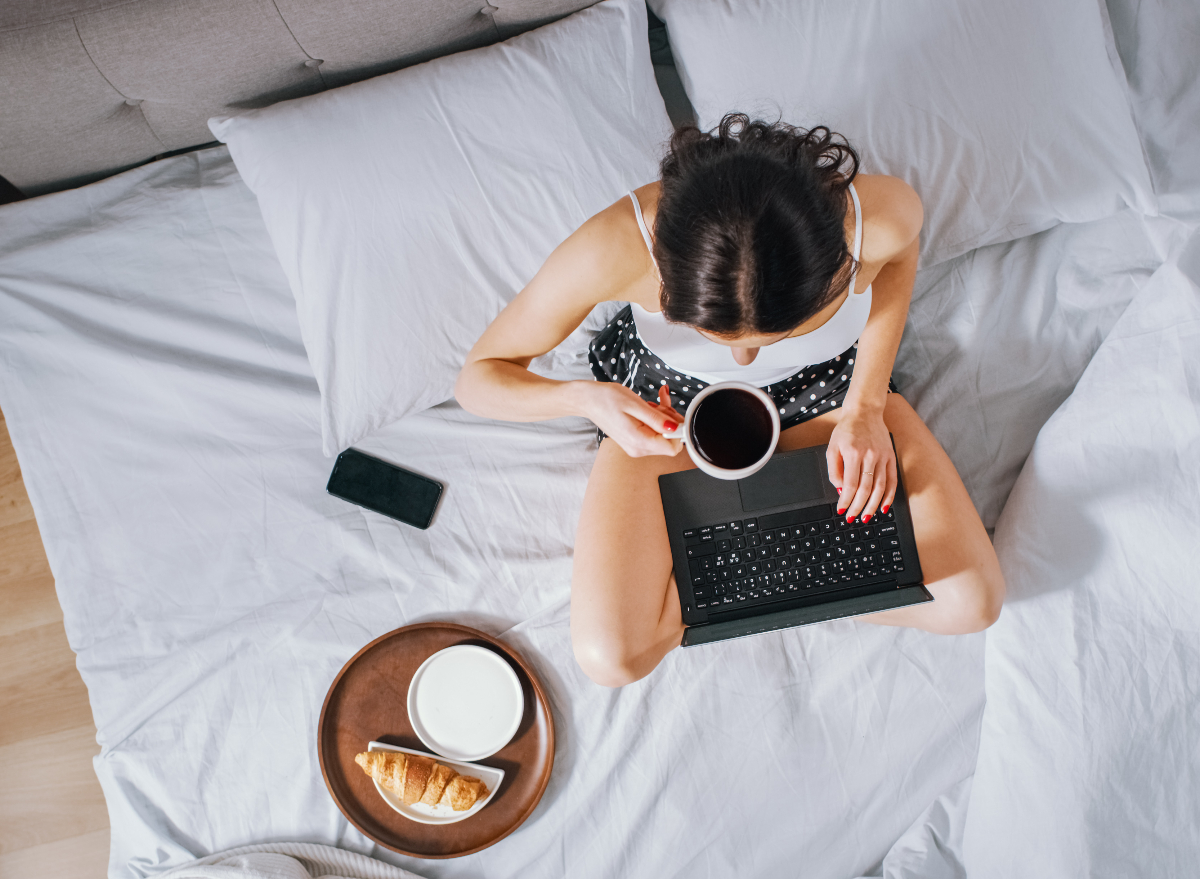
How much do you love snuggling up in your cozy bed after a long day? Until about two years ago, beds were usually reserved for sleeping. Since 2020, however, their prominence in our daily lives has risen to new heights. Life has changed, and our living spaces have morphed into workplaces, daycares, schools, and movie theaters, and our beds became makeshift offices. In the beginning, most people probably felt like they hit some sort of occupational jackpot. As the days and weeks passed, working from home turned into working from bed, and we all thought we were living the dream.
Fast forward two years later, and many people are only now discovering the ugly truth. Working from bed might be the world’s easiest commute, but eventually, you’ll have to pay the piper, and the price is good quality sleep. Read on to see how working from bed can ruin your sleep, and next, be sure to check out The 6 Best Exercises for Strong and Toned Arms in 2022, Trainer Says.
Working from bed disrupts your sleep-wake cycle

When you work from bed, your brain starts associating your bed with work, and that’s often the first ingredient in the recipe for poor sleep quality.
Stephen Light, Co-Owner of Nolah Mattress and Certified Sleep Science Coach, says, “To achieve the highest sleep quality possible, our brains need to be given the opportunity to link bedrooms and beds with sleep; that strong association is what helps trigger a restful sleep once we crawl into bed.”
Over time, working from bed can really mess up your circadian rhythm (or your body’s natural clock), making it exponentially harder to fall asleep. Light goes on to say, “Working while in bed can break down that connection and lead to the subconscious mind associating the bed with alertness, stress, and activity. Once the bed-sleep connection is weakened, you might find yourself unable to fall asleep, tossing and turning, and waking up fatigued.”
Moreover, when working in an office, you have clear boundaries between work and home (and, by extension, relaxation, and sleep). When you’re working from bed, there’s no proverbial light switch, so to speak, to flip at the end of the workday. Ultimately, that leaves you with an “always-on” mindset, and by the time bedtime finally rolls around, your mind is still signaling that it’s time to work, not time to sleep.
Related: 10 Ultra-Effective Sleep Hacks For A Better Night’s Rest
Blue light and sleep don’t mix

If you’re not good at setting boundaries and maintaining a good work-life balance, you probably find yourself working right up until bedtime. And while you may think this is great for your productivity, the truth is that exposure to blue light right up to bedtime could also be meddling with your sleep.
Light says, “Working on a device that emits blue light in bed—especially at night time or just before sleep—can inhibit the brain’s production of melatonin, resulting in poor sleep quality and insomnia.”
Exposure to any type of light suppresses your body’s production of melatonin. And while that’s pretty bad in and of itself, the exposure to blue light (courtesy of your laptop, smartphone, tablet, and even your TV) can have a far more powerful effect, with research showing that exposure to blue light can suppress your melatonin production for twice as long. At the end of the day (literally and figuratively), you just don’t feel sleepy while you’re using your devices. So, you end up aimlessly scrolling while you wait for sleep.
Pain keeps Z’s out of reach

Beyond disrupted sleep cycles and suppressed melatonin production, pain can also hamper your sleep. Leaning against a headboard or laying on your stomach for hours at a time can wreak havoc on your back and your posture. Light says, “Working from bed can put a strain on our back, joints, neck, and hips, leaving us achy and sore, [resulting in] aches and pains [that] can easily disturb our sleep.”
If your living arrangements force you to work from bed, below are some tips to help you improve your sleep quality.
You should set boundaries (and stick to them)
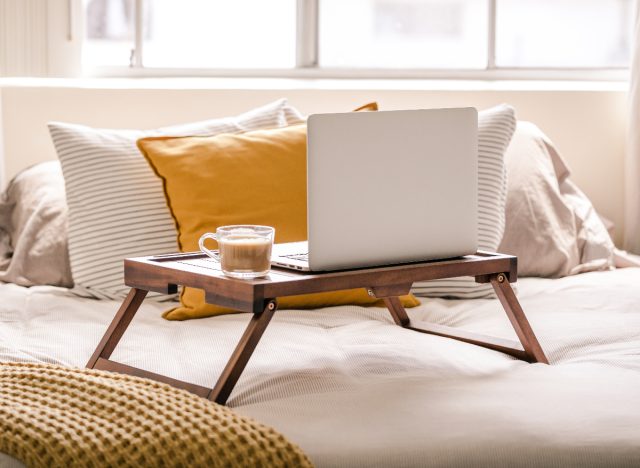
If you must work from bed, try your best not to burn the midnight oil. Set office hours for yourself, and stick to them.
In addition to maintaining mental boundaries between work and sleep, think about creating physical boundaries, too. Light suggests assigning areas for work and areas for sleep. “If you can, put a desk or small table in your bedroom so that you’ve created a clear distinction between work and sleep,” Light says. “You could even use a dresser or chest of drawers as a makeshift standing desk.”
Light suggests thinking about ergonomics, too. Not only can this mitigate any issues with pain, but it can also help you keep the association between bed and sleep. He says, “If your only option is to work from your bed, make sure that you’re supporting your back and recreating an upright sitting position as best as possible. That way, your body is at least still able to associate lying down with sleep.”
Related: This One Thing May Be Ruining Your Sleep, Experts Say
Clear away clutter
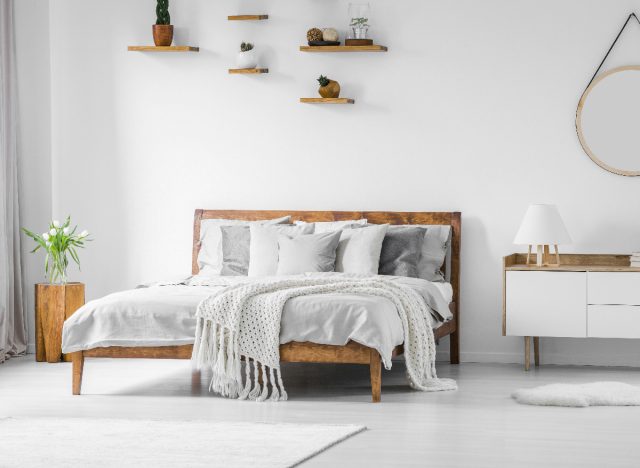
A cluttered, disorganized space can be counterproductive to feeling relaxed—and your bedroom is no exception. A messy desk in an office miles away won’t bother anyone, but when you’re staring at a mess five feet away, you’re less likely to get quality shuteye. If you must work from bed, take a few minutes to clear away the clutter at the end of the day. Even better, try to allocate a space where you can store your work essentials out of sight until you “return to work” the next day.
Monitor your screen time

Beyond keeping strict office hours, you might consider monitoring your screen time as well. To prevent any hiccups in your melatonin production and your sleep and wake cycles, try shutting off your devices at least two hours before bedtime.
Related: The Best Clothes To Wear For A Better Night’s Sleep, Expert Says
“Go to work” every day
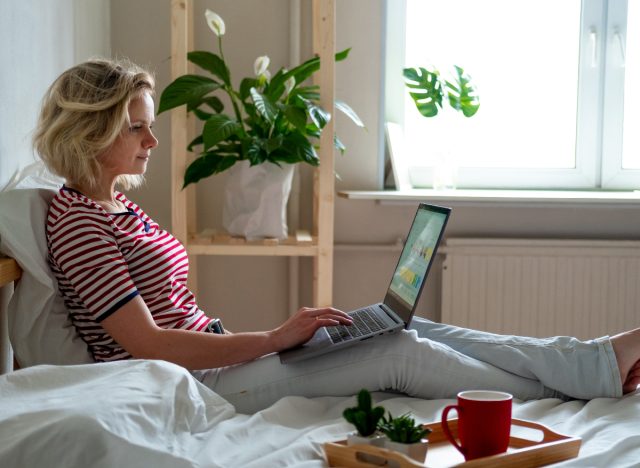
Getting up and getting dressed every day is another way to help yourself draw a line in the sand. No, you don’t have to go as far as office attire if you don’t want to, but think about getting prepared and dressed (as you would for work outside your home). At the very least, get out of your pajamas. Remember, it’s all about connections in your brain. The simple act of getting out of and into your pajamas daily could also signal your brain that it’s work time or bedtime.
Practice good sleep hygiene
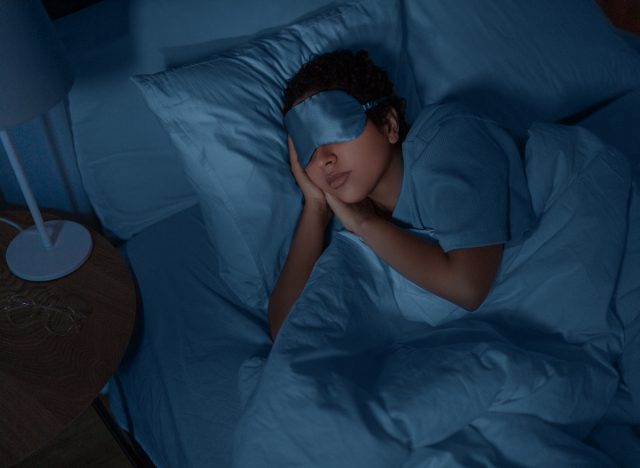
Good sleep hygiene and sleep quality go hand in hand. So, if you’re working from bed, don’t forget the basics.
- Stabilize your circadian rhythm by maintaining a consistent sleep schedule.
- Keep your room cool and dark when you’re not on the clock.
- Establish a calming bedtime routine.
- Exercise regularly.
Change the scenery

According to Light, setting the stage for sleep at the end of your day can make a big difference. “It can be a smart idea to remove all of your cozy bedding and use a brighter light setting while you work, and when your workday ends, replace the bedding and dim the lights to signal to your brain that the bed now serves a different purpose,” he says. “These symbolic differences can help propel you out of work mode and into sleep mode.”